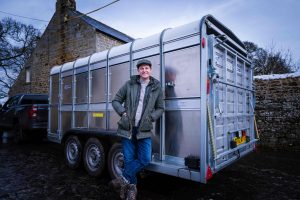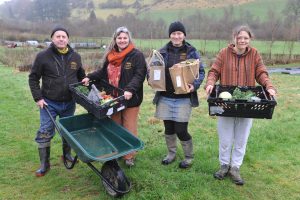
THE FUW’s Manifesto for the Welsh Assembly elections could not be clearer.
The contribution of agriculture to the economy of our rural areas and Wales as a whole cannot be underestimated; Welsh Farm Business Survey figures show that, despite low profitability, a typical farm can annually contribute between £100,000 and £250,000 to the wider economy.
Yet such direct contributions are just the tip of the iceberg; our food and drinks industry is worth £5.2 billion to the Welsh economy, and agriculture has been identified as the most significant contributor to an estimated £1.9 billion in ‘wildlife related activity’ – while the contribution of generations of farming families to the unique landscape and culture so important to our tourism industry is clear to all.
Put simply, farming is the bedrock of our rural communities, without which vast direct and indirect contributions to Wales’ economy as a whole would disappear.
And yet farming and rural affairs have often been perceived to be of little interest to a Welsh Labour government, which draws its strength from Wales’ former industrial heartlands around the south Wales valleys.
In a recent debate in Ceredigion County Council, many members expressed agreement with the view advanced by Cllr Paul Hinch, who said: “This last Welsh Government has no about rural life in Wales or anywhere else.
PARTY POLICIES AND PLEDGES
Certainly Welsh Conservatives and Plaid Cymru have both carved out distinctive positions on rural policy which point out a relative policy vacuum on rural affairs in Welsh Labour’s Assembly election manifesto. Not a single one of Labour’s six ‘key pledges’ relates to farming, other than tangentially, and a sweep of Welsh Labour’s website shows not a single announcement in relation to initiatives to help farmers under threat.
By way of contrast, Plaid Cymru has prepared a specific agricultural manifesto. Shadow Minister for Sustainable Communities, Farming and Food, Llyr Gruffydd, launched his party’s Agriculture Manifesto on Tuesday (April 12), vowing that a Plaid Cymru government would be a strong voice for Wales’ rural communities.
The plans included measures to address Labour’s CAP (Common Agricultural Policy) fiasco, scrap the six-day-standstill rule which is hampering farm businesses, introduce a strategy to save council farms from being sold off, and increase the amount of Welsh food purchased by the public sector in Wales.
Speaking ahead of the launch, Llyr Gruffydd, who lives on a family farm said: “If elected in May, a Plaid Cymru government would vow to be a strong voice for Wales’ rural communities.
“For too long, Labour Ministers have undermined our vital agriculture industry by making Wales the most modulated country in Europe – a decision that took £250m out of the pockets of Welsh farmers.
“Plaid Cymru wants to put this right by bringing forward policies that will ensure that the industry prospers in future.
“Our agriculture manifesto includes ambitious but achievable proposals to address Labour’s CAP fiasco and make sure Welsh farmers have a stronger voice in CAP simplification discussions, and scrap the six-daystandstill rule which is hampering farm businesses at the very time we need more flexibility.
“We would also introduce a strategy to save council farms from being sold off, under a wider programme to support new entrants into the industry.
“As part of Plaid Cymru’s wider proposals to raise procurement levels throughout Wales, we would ensure that the agriculture industry benefits from this by increasing the amount of Welsh food purchased by the public sector.”
Meanwhile, the Welsh Conservatives launched their rural manifesto on Friday, April 8.
Pledging to ‘bring rural Wales in from the cold’, Andrew RT Davies and Russell George announced a series of policy promises which they claimed recognised the specific needs of rural communities.
Andrew RT Davies, himself a member of a family farming business, said: “Welsh Conservatives would stand up for the farming industry and the rural communities around it.
“Assessing the impact of government policies shouldn’t be done by the same civil servants who draw it up. That responsibility should lie with the people who know best – rural communities themselves.”
Prospective Welsh Conservative Assembly Member, Russell George, said: “That Welsh Labour have relegated Rural Affairs to a junior cabinet post speaks volumes for Labour’s neglect of agriculture and the countryside.
“A Welsh Conservative Government would end this neglect and stand up for rural Wales.”
ONE POLICY: NO AGREEMENT
The Liberal Democrats’ agricultural manifesto launch, on April 11, was a feisty affair – as detailed by our reporter Matthew Bearne elsewhere in these pages. Noticeably, Kirsty Williams, the Welsh LibDem leader did not fight shy of providing her personal opinion on one of the burning issues affecting West Wales’s farmers: Bovine TB. The view of two of west Wales’s councils and both of Wales’main farming unions is crystalline on the point: in short, culling badgers is a necessary part of a combined approach to the control of Bovine TB. Not the only solution, but part of a holistic approach to the issue.
While the validity of statistical evidence and the science deployed by those on either side of the culling debate is likely to remain subjective and views to remain entrenched, there is a marked divide between most farmers and the west Wales councils on the one hand and the immediately past Welsh Government on the other.
But it is a mistake to conflate the debate about the future of Welsh agriculture with a single topic, no matter how passionately argued. A CONNECTED WALES Access to rural broadband is a live issue. A recent public meeting held in Whitland highlighted the gulf between public desire and expectation and the willingness of BT to provide a solution to every household and every business. As more and more of the paperwork that accompanies farming is planned to be completed online, fast and reliable broadband is essential for all farmers and all rural communities.
In addition, as Richard Walker of the FUW recently said: “The revolution in renewable energy, brought about by recognition of the need to reduce our reliance on fossil fuels, has resulted in the development of new commercially viable sources of renewable energy, such as solar panels, as well as improvements in the efficiency of wind and water power.”
Despite Wales’ being perfectly suited for some forms of renewable energy generation, the percentage of electricity generated in Wales from renewable stands at just 10% – 5% lower than the UK average, and the lowest of all the UK devolved regions.
NFU Cymru’s ambition is for every farm to be able to become a net energy exporter, and in doing so helping contribute towards the Welsh Government’s greenhouse gas reduction targets.
The FUW has gone a step further and called on the next Welsh Government to seek ‘alternative and innovative ways’ in which funding can be provided in order to develop on-farm energy production and identify those barriers to on-farm energy production which fall within the remit of Welsh Government.
Next week, The Herald will be reporting on one such on-farm project and establishing just how viable it is for farms not only to power the rural economy, but also to provide power to Welsh homes and businesses.

















Add Comment